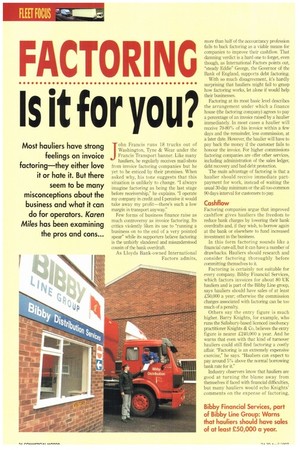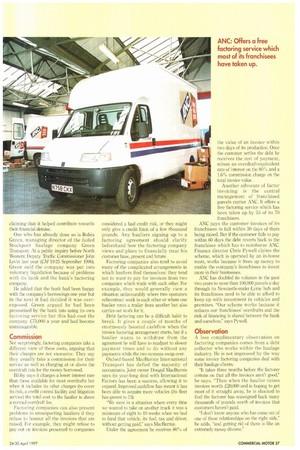FACTOR!
Page 38

Page 39

If you've noticed an error in this article please click here to report it so we can fix it.
Is it for you.
Most hauliers have strong feelings on invoice factoring—they either love it or hate it. But there seem to be many misconceptions about the business and what it can do for operators. Karen Miles has been examining the pros and cons...
john Francis runs 18 trucks out of Washington, Tyne & Wear under the Francis Transport banner. Like many hauliers, he regularly receives mail-shots from invoice factoring companies but he yet to be enticed by their promises. When asked why, his tone suggests that this situation is unlikely to change. "I always imagine factoring as being the last stage before receivership," he explains. "I operate my company in credit and I perceive it would take away my profit—there's such a low margin in transport anyway."
Few forms of business finance raise as much controversy as invoice factoring. Its critics violently liken its use to "running a business on to the end of a very pointed spear" while its supporters believe factoring is the unfairly slandered and misunderstood cousin of the bank overdraft.
As Lloyds Bank-owned International Factors admits, more than half of the accountancy profession fails to back factoring as a viable means for companies to improve their cashflow. That damning verdict is a hard one to forget, even though, as International Factors points out, "steady Eddie" George, the Governor of the Bank of England, supports debt factoring.
With so much disagreement, it's hardly surprising that hauliers might fail to grasp how factoring works, let alone if would help their businesses.
Factoring at its most basic level describes the arrangement under which a finance house (the factoring company) agrees to pay a percentage of an invoice raised by a haulier immediately. In most cases a haulier will receive 70-80% of his invoice within a few days and the remainder, less commission, at a later date. However, the haulier will have to pay back the money if the customer fails to honour the invoice. For higher commissions factoring companies are offer other services, including administration of the sales ledger, debt recovery and bad debt protection.
The main advantage of factoring is that a haulier should receive immediate partpayment for work, instead of waiting the usual 30-day minimum or the all-too.common 90 days interval for customers to pay.
Cashf low
Factoring companies argue that improved cashflow gives hauliers the freedom to reduce bank charges by lowering their bank overdrafts and, if they wish, to borrow again at the bank or elsewhere to fund increased investment in the business In this form factoring sounds like a financial cure-all, but it can have a number of drawbacks. Hauliers should research and consider factoring thoroughly before committing themselves to it.
Factoring is certainly not suitable for every company. Bibby Financial Services, which factors invoices for about 80 UK hauliers and is part of the Bibby Line group, says hauliers should have sales of at least £50,000 a year; otherwise the commission charges associated with factoring can be too much of a penalty
Others say the entry figure is much higher. Barry Knights, for example, who runs the Salisbury-based licenceci insolvency practitioner Knights & Co, believes the entry figure is nearer £240,000 a year. And he warns that even with that kind of turnover hauliers could still find factoring a costly affair. "Factoring is an extremely expensive exercise," he says. "Hauliers can expect to pay around 5% above the normal borrowing bank rate for it."
Industry observers know that hauliers are good at turning the blame away from themselves if faced with financial difficulties, but many hauliers would echo Knights' comments on the expense of factoring,
claiming that it helped contribute towards their financial demise.
One who has already done so is Robin Green, managing director of the failed Stockport haulage company Green Transport. At a public inquiry before North Western Deputy Traffic Commissioner John Levin last year (CM 19-25 September 1996), Green said the company was put into voluntary liquidation because of problems with its bank and the bank's factoring company.
lie added that the bank had been happy with the company's borrowings one year but in the next it hac.1 decided it was overexposed. Green argued he had been pressurised by the bank into using its own factoring service but this had cost the company £75,000 a year and had become unmanageable.
Commission Nor surprisingly, factoring companies take a different view of these costs, arguing that their charges are not excessive. They say they usually take a commission for their service as well as charging at or above the overdraft rate for the money borrowed.
Bibby says it charges a lower interest rate than those available for most overdrafts but when it includes its other charges (to cover its risk, a credit control facility and litigation service) the total cost to the haulier is above a normal overdraft fee.
Factoring companies can also present problems to unsuspecting hauliers if they refuse to honour all the invoices that are raised. For example, they might refuse to pay out on invoices presented to companies considered a bad credit risk, or they might only give a credit limit of a few thousand pounds. Any hauliers signing up to a factoring agreement should clarify beforehand how the factoring company views and plans to financially treat his customer base, present and future.
Factoring companies also tend to avoid many of the complicated arrangements in which hauliers find themselves: they tend not to want to pay for invoices from two companies which trade with each other. For example, they would generally view a situation unfavourably where two operators subcontract work to each other or where one haulier rents a trailer from another but also carries out work for it.
Debt factoring can be a difficult habit to break. It gives a couple of months of enormously boosted cashflow when the invoice factoring arrangement starts, but if a haulier wants to withdraw from the agreement he will have to readjust to slower payment times and to do without any payments while the two systems swap over.
Oxford based MacBur nie International Transport has defied the majority of accountants, Joint owner Dougal MacBurnie says its year-long deal with International Factors has been a success, allowing it to expand. Improved cashllow has meant it has been able to acquire more vehicles (its fleet has grown to 13).
We were in a situation where every time we wanted to take on another truck it was a minimum of eight to 10 weeks when we had to fund that vehicle, its fuel, tax and driver, without getting paid," says MacBurnie.
Under the agreement he receives 80% of the value of an invoice within two days of its production. Once the customer settles the debt he receives the rest of payment, minus an overdraft-equivalent rate of interest on the 80% and a 1,6% commission charge on the total invoice value.
Another advocate of factor invoicing is the central management of franchised parcels carrier ANC. It offers a free factoring service which has been taken up by 55 of its 70 franchisees.
ANC pays the customer invoices of its franchisees in full within 30 days of them being raised. But if the customer fails to pay within 60 days the debt reverts back to the franchisee which has to reimburse ANC. Finance director Chris Pywell claims the scheme, which is operated by an in-house team, works because it frees up money to enable the company's franchisees to invest more in their businesses.
ANC has doubled its volumes in the past two years to more than 100,000 parcels a day through its Newcastle-under-Lyme hub and its franchisees need to be able to afford to keep up with investment in vehicles and premises. "Our scheme works because it reduces our franchisees' overdrafts and the risk of financing is shared between the bank and ourselves," says Pywell.
Observation A less complimentary observation on factoring companies comes from a debt collector who works within the haulage industry. He is not impressed by the way some invoice factoring companies deal with their haulage clients.
"It takes three months before the factorer cottons on that all the invoices aren't good," he says. "Then when the haulier raises invoices worth ,f20,000 and is hoping to get most of it straight away, he is shocked to find the factorer has reassigned back many thousands of pounds worth of invoices that customers haven't paid.
"I don't know anyone who has come out of one of these relationships on the right side," he adds, "and getting rid of them is like an extremely messy divorce."




















































































































